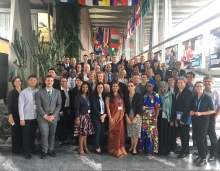WHO, ILO and OECD Launch the International Platform on Health Worker Mobility

by Genevieve Gencianos
PSI participated in the meeting, which was attended by 79 participants representing national governments, civil society, trade unions, employers’ associations, national regulatory bodies, international credential verification organisations, and international agencies. The PSI representatives to the meeting included Baba Aye, PSI Health and Social Services Officer, Genevieve Gencianos, PSI Migration Programme Coordinator and Herbert Beck, who was also representing the European Federation of Public Services Unions (EPSU).
The aim of the meeting was to discuss existing policy measures and to identify strategic actions to strengthen the management and governance of health worker mobility. The Platform is one of the recommendations from the report of the United Nations High Level Commission on Health Employment and Economic Growth (UNComHEEG), where the PSI General Secretary Rosa Pavanelli was one of the Commissioners.
Genevieve Gencianos presented the perspective of PSI on the issue of Global Skills Partnerships (GSP), which is a new form of skills mobility being promoted in the context of the recently adopted United Nations Global Compact on Migration. PSI is critically examining the concept of GSPs, particularly in the health sector, where demographic trends and health worker shortage will be driving health worker migration in the coming years. In her presentation, Gencianos highlighted core elements that should constitute any consideration of global skills partnerships, namely: tripartism and social dialogue, equity, sustainability and human rights, and the application of international norms and standards, including those contained in the WHO Global Code of Practice on the International Recruitment of Health Personnel, and the UN and ILO Conventions on Migrant Workers.
Throughout the two days of panel discussions and break-out groups, meeting participants identified strategic actions which included strengthened information and knowledge exchange at the global level, capacity-building around bilateral agreements, review of the WHO list of countries with critical health shortages, enhanced policy and multi-sectoral dialogues at the national level and the development of knowledge repositories in areas relevant to health worker mobility (see full IPHWM Meeting Notes here: https://www.who.int/hrh/migration/platform-meeting-h-w-mobility/en/).
This meeting is only the first among the activities of the IPHWM. PSI will continue to play an active role in the platform, bringing its concrete best practice example from the Germany-Philippines Bilateral Labour Agreement on Nurses, its pioneering analysis of the GSPs, and its broader global policy advocacy in the context of the UN Global Compact on Migration.
To read PSI’s Analysis of the Global Skills Partnerships in the Health Sector:
http://world-psi.org/sites/default/files/attachment/news/web_2018_mig_report_marrakesh.pdf
Genevieve Gencianos is the Migration Programme Coordinator of PSI.

